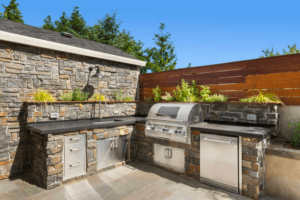Marble and granite have been in use for thousands of years, but processed stones like Quartzforms have been created using modern technologies and deliberately designed to meet consumer needs. If all you want is a gorgeous yet practical kitchen worktop, the question can seem boggling yet vital: which is really better? As always, the answer depends on what you’re looking for. Here are a few ways our stones go head to head.
Which is More Affordable?
Sticking within budget is important, and we’re always happy to show our customers options that fit within a certain price range. However, many people are surprised to discover that they can have a real choice between natural stones, such as limestone and granite, and premium engineered stones, such as Quartzform worktops, at a budget price. By visiting our workshop, you can get a hands-on comparison and also learn more about which options (such as edging and polish types) increase the overall cost.
Which Lasts Longer?
Both man-made and natural stones are tough as rock and very hard to chip, crack or damage. The expected lifespan on both is at least a decade, with many engineered stones coming with a 10-20 year or lifetime warranty. If you’re looking at a century or more, natural stone may well have the edge – it’s certainly been more thoroughly tested!
What About Colours?
While natural stones are available in more colours than you might expect, including greens, yellows, reds and blues, they can’t beat the shear range that the creative engineers behind stones like Quartzforms have come up with. If you want your kitchen worktops to really pop, engineered stone is the way to go.
Which is Better for the Planet?
The environment is a key reason people often give for choosing natural materials over man-made or processed materials. However, while some decisions are clear cut, that’s not always the case. In the world of stone working, the environmental question is complex and you will probably have to pick a priority. As an example, if we’re considering carbon footprints, natural stone is found in quarries around the world and often has to be shipped long ways to reach its final use point. Stone is heavy, which means it takes a lot of fuel to transport. On the flip side, engineered stones are often made within Europe, so may have less distance to travel.
Depending on the manufacturing process and quarrying situation, one or the other may use more energy, and depending on where the factory or quarry is, environmental responsibility standards may be high (e.g. Europe) or lower (e.g. China). If you’re trying to avoid using non-renewable materials, then natural stones contain only natural materials, obviously, but they are themselves as non-renewable as fossil fuels in that they are formed much more slowly than we use them. Processed stones are primarily made of stone particles, so are more directly recyclable. In terms of petrochemicals, engineered stones (such as Quartzforms worktops) are bonded together with resins which may contain petrochemicals, while natural stones like marble require sealants which may be of similar composition.
Overall, our conclusion at Surrey Marble and Granite is, as it has always been, that it’s not about finding some ideal stone but finding the right stone for the job, and that might be natural, man-made or even a combination.





